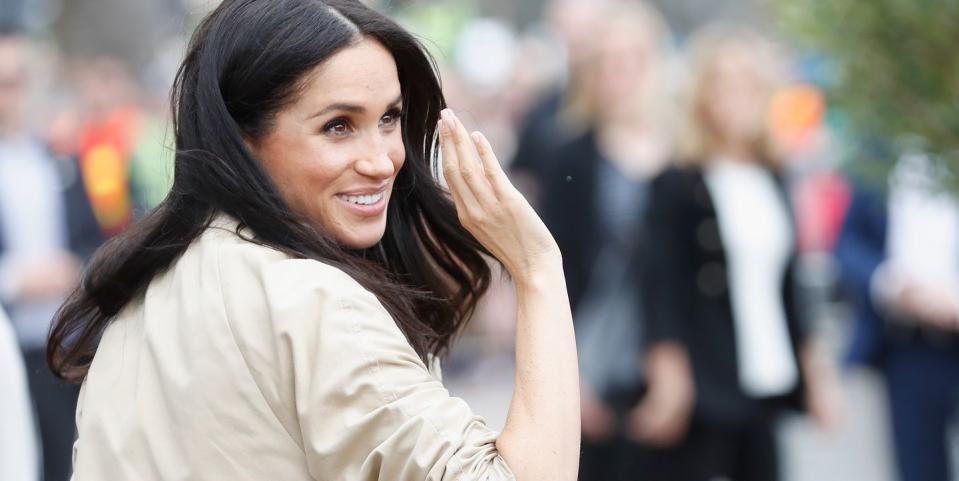6 Common Myths About Having Kids in Your Late 30s

When a member of the royal family announces they are expecting a baby, it is usually met with excitement, along with immediate speculation over the gender, name and title of the future prince or princess.
Since Kensington Palace made the announcement that the Duke and Duchess of Sussex will become parents in the spring, they have received all of the above. But an additional and uncomfortable conjecture has come up, and it's down to Meghan's age.
The Duchess is to become a mother for the first time at 37 years old. This has sparked further speculation over her fertility, which started long before she married Prince Harry in May, when there were underlying whisperings and antiquated presumptions of ticking biological clocks.
Yet, the Duchess is definitely not alone. According to the most recent figures from the Office of National Statistics, the average age of a first time mother has increased to 28.8 years. More than half (54%) of all babies were born to mothers aged 30 or over, a significant increase from 1996 - when 41% babies were born to mothers in the 30+ demographic and 48% in 2006.
Despite these statistics highlighting the trend for women to start a family later in life in comparison with previous decades, there continue to be perpetuating misconceptions when it comes to fertility and raising children for women in their late thirties.
To uncover these myths, we asked experts from the NCT (National Childbirth Trust) and HCA healthcare, who run private maternity and fertility clinics around the UK. This is what they said.

Myth 1: It will take you longer to get pregnant if you try to conceive in your late 30s
Reality: "NICE [the National Institute for Healthcare and Excellence] states that over 80% of couples conceive within one year if the woman is aged under 40 years, they do not use contraception and regularly have sexual intercourse," Elizabeth Duff, the senior policy advisor at the NCT tells us. "This percentage decreases slightly the closer to 40 years of age a woman gets."
Myth 2: It's uncommon to become a mom in your late 30s as your fertility decreases
Reality:"It is, in fact, quite common," says Duff. "Almost one fifth (17.7%) of all births in 2016-17 were by mothers aged 35-39, according to NHS Maternity Statistics for England."
Dr James Nicopoullos, a specialist in reproductive medicine at the HCA's Lister Fertility Clinic, says while it is "definitely not uncommon to fall pregnant in your late 30s", it could take a little longer.
Myth 3: You are more at risk of a miscarriage if you're pregnant in your late thirties
Reality: Yes, there is a slightly higher risk of miscarriage. According to the charity Tommy's, in women under thirty, one in ten pregnancies will end in a miscarriage. In women aged between 35-39, this increases slightly to up to two in ten pregnancies.
One in four women will experience a miscarriage in their lifetime, according to the charity. The NHS also notes that, for most women, a miscarriage is a one-off event and they go on to have a successful pregnancy in the future.
"As traumatic and difficult as an early miscarriage can be, it is usually the body’s quality control mechanism that ensures that an embryo developed from a genetically abnormal egg (or, less commonly, sperm) does not proceed," explains Dr Nicopoullos.
Myth 4: If you are pregnant over the age of 35, you must have had IVF
Reality: No. 80% couples conceive naturally within one year up until the age of 40. According to the most recent figures from the Department of Health's Human Fertilisation and Embryology Authority, in 2016, 42% of patients undergoing IVF treatment cycles were under 35. 23% were aged between 35–37, 14% aged 38–39, 14% aged 40–42 and 4% aged 43–44. The median age for an IVF patient was 35.5 years old.
Dr Nicopoullos says couples who are struggling to conceive naturally, should consider investigation and treatment as early as possible "as the chances of fertility treatment success begins to decline rapidly from your late 30s".
Myth 5: You are classed as a 'geriatric' mother
Reality: There has been a lot of debate over the Duchess of Sussex being classed as a 'geriatric mother', but Dr Nicopoullos says the term is generally not used by doctors due to its "obvious negative associations." In their online guide to pregnancy, the NHS does not refer to women in their thirties having children as 'geriatric' - it is thought to be a term previously used a few decades ago.
"There is no absolute 'edge of a cliff' cut off point after which the risks of falling pregnant suddenly start to plummet," Dr Nicopoullos reminds us. "This has to be individually discussed with women at all ages, taking into account their health and wellbeing also."

Myth 6: You're more at risk of having complications during pregnancy and childbirth
Reality: There are slightly more risks of complications during pregnancy and childbirth for first time mothers in their late thirties, says Duff. "These include a higher chance of diabetes, pre-eclampsia, high blood pressure, miscarriage and having a baby with Down’s Syndrome. However, the majority of these women are fit, healthy and likely to have straightforward births and healthy babies."
All in all, there are certain risks in pregnancy and childbirth for woman as they get older - which is the case of most health conditions, if we're honest - but this is by no means the case of the majority.
As Duff at the NCT - which supports thousands of women during pregnancy, birth and early parenthood across the UK each year - says: "There are many reasons for parents choosing to have their children later on in life, with some waiting until they can have their babies in a financially stable or family setting.
"The majority of mothers in their late 30s are fit, healthy and likely to have straightforward births and healthy babies."
With more and more women choosing to start a family later on life, isn't it time we put a stop to the negative, and often sexist, labels and associations with first time mothers who may be past the age of 35? The outdated terminology could do with an overhaul.
('You Might Also Like',)
